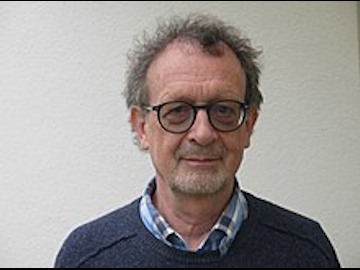Breaking out of the logic of war: Is there a peace perspective for the Russian-Ukrainian war?
1. 3. 2024 | Politics

We are publishing a contribution by Werner Wintersteiner, PhD, retired professor at the University of Klagenfurt (AAU), Austria, peace researcher and co-editor with Wilfried Graf of the German version of the book by Edgar Morin: From War to War. From 1940 to the invasion of Ukraine (Turia+Kant 2023). He was a speaker at the second debate of the cycle Thinking Peace: Awakening the Peace Movement in Koper.
- AGGRESSION DYNAMICS – VIOLENCE CREATES VIOLENCE
The Russian aggression against Ukraine has not only caused and continues to cause endless suffering, but has also triggered a dangerous dynamic in international relations. The West is not only supporting the Ukrainian defensive struggle, as they say, but is also switching to a war system itself – with massive armament, a reduction in all contacts with the “enemy”, mental militarization and increasing tunnel vision, and even an absolutely unreal discussion about European states having their own nuclear weapons. The Zeitenwende (turning point) proclaimed by German Chancellor Scholz is not an objective description of the situation, but a political statement that threatens to become a self-fulfilling prophecy. This has created a climate of fear and terror on both sides – fear of the opponent and the terror that is believed to be necessary in order to slow him down. But this is exactly how the escalation spiral develops and we all remain trapped in our own logic of war.
2. THE ELEPHANT IN THE ROOM – THE CLIMATE CATASTROPHE
Nobody is talking about it, but one thing is clear: this war is a serious setback for the fight against the climate catastrophe with hardly foreseeable consequences. It is not just about the destruction of the environment in Ukraine itself; the ecological costs of the massive arms build-up on both sides and the indirect costs must also be taken into account – because the money that flows into armaments is not spent on climate protection. And finally, there is also the psychological factor: the attention of politicians and the wider audience is turning away from climate and biodiversity – the entire mindset is shifting, as if nature would wait in peace until we humans have finished our disputes. If Martians were watching us, they would think we are crazy for slaughtering each other instead of doing everything we can to save ourselves from the dangers we have unfortunately caused ourselves.
- POSSIBILITIES TO END THE WAR
The war can be ended in four ways:
– Victory of one of the two sides;
– bleeding out and exhaustion of both sides;
– change of power in Russia and voluntary termination of the war;
– or massive intervention by forces of the world community demanding an end to hostilities.
Theoretically, a fifth scenario is conceivable, namely an elementary world event that forces the parties involved to devote all their energies to it, such as a major natural disaster as a result of climate change. While option 3, a Russian regime change, currently seems quite unlikely (but one should never rule anything out completely), Russia as well as Ukraine and the West are banking on option 1, a peace through victory. So far, however, the result has been a protracted war with no clear advantages for either side and therefore no foreseeable end and thus, the prospect of option 2, a war to mutual exhaustion with a constant risk of escalation. Numerous Western military experts consider this to be the most likely scenario. Unfortunately, no one is discussing option 4, which is also a symptom of the worldwide decline in peace thinking. After all, the UN was created as a strong and universally recognized institution to defuse conflicts between states or to end wars as quickly as possible. Of course, this mechanism, especially the UN Security Council, no longer works as soon as one of its members is involved in the conflict. But there are other possibilities that have not yet been given sufficient attention. Even if the UN is currently severely impaired in its work, this is by no means a reason to throw the UN idea overboard – i.e. the principles and tenets of non-violent conflict resolution and collective security.
- BUILDING AN ANTI-WAR COALITION
Even if we, with our Western arrogance, usually don’t even realize it: The states that represent the majority of the world’s population have shown in the UN votes: they don’t want this war, and they don’t want to be dragged into it on one side or the other. And they are acting ever more confidently on the global stage. Numerous states, especially in the South, have launched mediation initiatives:
Turkey, Italy, an international working group of the Vatican, Mexico, Brazil, a group of states of the African Union, the People’s Republic of China, Indonesia … There have also been initiatives by individual personalities, such as the Nobel Peace Prize winner and former President of Costa Rica, Óscar Arias Sánchez. These initiatives are very valuable, even if they have not been successful so far. However, the grain agreement has shown just how sensitive Russia is to initiatives from countries of the South. If these initiatives could now form a joint anti-war coalition, a new situation would arise. And neutral states like Austria in particular should support such initiatives to the best of their ability instead of standing on the sidelines. Because if you really want peace, you have to prepare for peace.
- SEARCHING FOR CREATIVE SOLUTIONS TO THE CONFLICT
A cessation of hostilities does not necessarily mean, as is often falsely claimed, a capitulation by Ukraine or recognition of the Russian conquests. As many historical examples show, a demilitarized zone, a temporary UN administration of disputed territories and a long-term process of negotiating a peace solution are also conceivable. Of course, this peaceful path entails the same risk of failure as the current raging war – but with the major difference that it leaves human lives, nature and settlements, transportation routes, industrial plants and agriculture unscathed. Of course, it will have to be borne in mind that real peace can only be achieved if the basic needs (not the demands or war aims!) of both sides are taken into account – a difficult and long-term undertaking. But the sooner the guns fall silent, the sooner this goal will be achievable.
- BELIEVING IN PEACE
It is utterly astonishing that so few voices are in favor of peace, especially in light of the dangerous development of the Russian war against Ukraine. Why do we believe in war and not in peace? Why have we suppressed the experience from the end of the Cold War that security can only be achieved together and that détente and disarmament are possible if we have the courage to take confidence-building measures? We should finally mobilize the reserves of critical thinking, courage, imagination and creativity that lie dormant within us!




